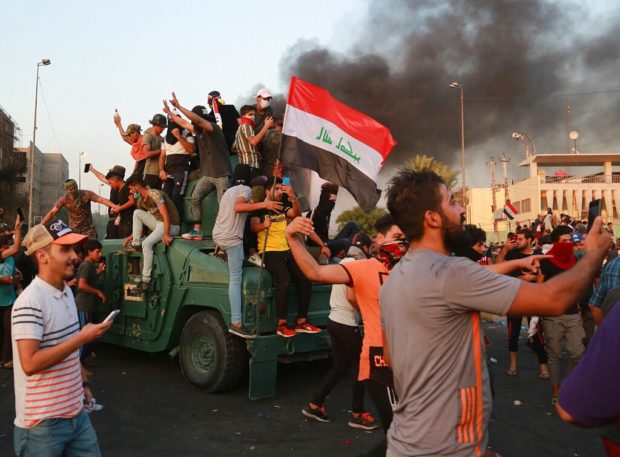Shiite cleric warns Iraq’s leaders; protest death toll at 42

Anti-government protesters take over an armored vehicle before they burn it during a demonstration in Baghdad, Iraq, Thursday, Oct. 3, 2019. Iraqi security forces fired live bullets into the air and used tear gas against a few hundred protesters in central Baghdad on Thursday, hours after a curfew was announced in the Iraqi capital on the heels of two days of deadly violence that gripped the country amid anti-government protests. (AP Photo/Hadi Mizban)
BAGHDAD — Iraq’s top Shiite cleric on Friday sharply criticized the government in the wake of deadly violence gripping the country, urging both the political leaders and the protesters to pull back “before it is too late” as the death toll in this week’s anti-government demonstrations climbed to 42.
The highly-anticipated comments by Grand Ayatollah Ali al-Sistani were his first since the protests erupted earlier this week. Many across Iraq’s predominantly Shiite south had looked to the influential cleric for guidance.
Al-Sistani’s sermon came just hours after Iraq’s prime minister called on protesters to go home, comparing security measures imposed in the wake of the demonstrations to “bitter medicine” that needs to be swallowed.
Since Tuesday, security forces have fired live rounds and tear gas every day to disperse protesters across multiple provinces demanding job opportunities, improved services and an end to corruption.
The rallies have erupted spontaneously, mostly spurred by youths wanting jobs, improved services such as electricity and water, and an end to endemic corruption in the oil-rich country. Authorities have also cut internet access in much of Iraq since late Wednesday, in a desperate move to curb the rallies.
Article continues after this advertisementAl-Sistani blamed the leaders of the two biggest parliament blocs in particular, saying they failed to make good on their promises.
Article continues after this advertisement“The government and the political sides have not fulfilled the demands of the people to fight corruption,” al-Sistani said in his Friday sermon, delivered by his representative Ahmed al-Safi in the Shiite holy city of Karbala.
Al-Sistani called on political leaders to take “practical and clear steps” toward combatting corruption and on the government to “carry out its duty” to diminish people’s suffering. He also reiterated his suggestion for a committee of technocrats tasked with making recommendations on fighting corruption, as a way out of the current crisis.
It was not immediately clear whether al-Sistani’s comments would give momentum to protesters or help diffuse the situation.
Earlier in the day, Prime Minister Adel Abdul-Mahdi urged anti-government protesters to disband, saying their “legitimate demands” have been heard.
But dozens of protesters defied his message, gathering shortly before noon near Baghdad’s central Tahrir Square. Many had camped out on the streets overnight.
Security forces responded by firing live bullets to disperse the crowd near Tahrir.
Meanwhile, Iraqi hospital officials reported nine more deaths in the southern city of Nasiriyah, about 320 kilometers (200 miles) southeast of Baghdad, bringing this week’s overall death toll to 42.
Hospital officials said the deaths occurred late Thursday. Nasiriyah has witnessed the most violence in the protests, with at least 25 people, including a policeman, killed. The officials spoke to The Associated Press on condition of anonymity in line with regulations.
Abdul-Mahdi spoke in a televised address to the nation, broadcast at 2:30 a.m., about the demonstrations that have spread across many provinces in the country.
“We will not make empty promises … or promise what we cannot achieve,” said Abdul-Mahdi, who hails from Nasiriyah.
He said there is “no magic solution” to Iraq’s problems but pledged to work on laws granting poor families a basic income, provide alternative housing to violators and fight corruption.
“The security measures we are taking, including temporary curfew, are difficult choices. But like bitter medicine, they are inevitable,” he said. “We have to return life to normal in all provinces and respect the law.”
The prime minister also defended the nation’s security forces, saying they abide by strict rules against use of “excessive violence” and that it was the escalation of the protests that leads to violence.
He also said, without elaborating, that he “regrets some have successfully derailed some of the protests from their peaceful path” in order to “exploit” the violence for political reasons.
The unrest is the most serious challenge for Abdul-Mahdi’s year-old government, which also has been caught in the middle of increasing U.S.-Iran tensions in the region. Iraq is allied with both countries and hosts thousands of U.S. troops, as well as powerful paramilitary forces allied with Iran.
The mostly leaderless protests have been concentrated in Baghdad and in predominantly Shiite areas of southern Iraq, bringing out jobless youths and university graduates who are suffering under an economy reeling from graft and mismanagement.
In Nasiriyah, protester Haidar Hamid dismissed the prime minister’s speech, saying instead that said he was looking to the Shiite religious authority for a resolution.
“If the government is not dissolved, we will avenge our martyrs,” said Hamid, an unemployed 32-year-old.
A group that monitors internet and cybersecurity, NetBlocks, said internet was briefly restored before al-Mahdi’s speech but by the time he was on screen access was again shut as new videos emerged of the protests. The internet in Iraq’s northern Kurdish region has not been affected.
On Thursday, Iraq closed a border crossing with Iran in the eastern province of Diyala, saying it will remain closed until further notice. Protesters who had blocked sections of the road to Baghdad’s International Airport late Thursday had dispersed before daylight. /jpv